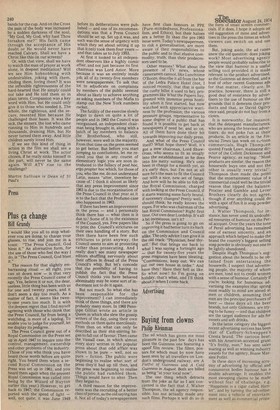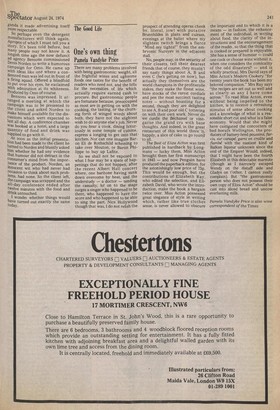Advertising
Buying from clowns
Philip Klemm an The ad which has given me most pleasure in the past few days has been the Guinness one featuring a spoof film review. The films, posters for which must by now have been seen by all travellers on London's underground railway, are A Fistful of Guinness and A Cold Guinness in August. Both are billed as being "at your local now".
The one thing which detracts from the joke as far as I am concerned is the fact that J. Walter Thompson, the ad agency responsible, has not actually made any such films. Perhaps it will do so in
Spectator August 24, 1974 the form of small screen commercials. If it does, I hope it adopts an old suggestion of mine and advertises in the press the times at which viewers can switch on and see them.
But, joking aside, the ad raises anew the old question: does joking work? Most advertising agency people would probably subscribe to the view that humour is a useful selling tool provided it is made relevant to the product advertised, as the Guinness ad described, and a host of other recent Guinness ads for that matter, clearly are. In practice, however, there is still a good deal of resistance by advertisers to the use of humour on the grounds that it demeans their products and that, as David OgilvY once said, people do not buy from a clown.
It is noteworthy, for instance, that the detergent manufacturers, who are among the heaviest advertisers, do not poke fun at their products. In an article in the Financial Times last week on cw-toon commercials, Hugh Thompoon quoted Frank Lowe, managing director of the Collett Dickenson and Pearce agency, as saying: "Most products are similar, the reason the housewife buys one and not the other is usually very trivial"Thompson then made the point that the entertainment value of a commercial could well be the trivial reason that tipped the balance. Procter and Gamble and Lever Brothers clearly do not agree, though if ever anything could do with a spot of fun it is soap powder advertising.
J. Walter Thompson, for instance, has never used its undoubted resources of humour on the Persil account. Over the years the tone of Persil advertising has remained one of earnest sincerity, and an approach which helped to make the brand the country's biggest selling soap powder is obviously not one to be lightly abandoned.
Despite Hugh Thompson's suggestion about the benefit to be obtained from entertaining the housewife, I suspect that advertising people, the majority of whom are men, tend not to credit women with a sense of humour. Certainly if you're looking for humorous advertising the examples that spring most readily to mind are aimed at men or children, assuming that men are the principal purchasers of beer — these days all the beer brands, not only Guinness, are trying to be funny — and that children are the target audience for ads for sweets and soft drinks.
In the latter category the biggest recent advertising success has been that of Cadbury-Schweppes's Cresta brand. The cartoon bear, with his American-accented grunt "It's frothy, man," has sent sales soaring as well as winning industry awards for the agency, Boase Massimi Pollitt,
In these days of increasing scrutiny of advertising by official and consumerist bodies humour has a double advantage. It enables the most sweeping claims to be made without fear of challenge, e.g. "Happiness is a cigar called Hamlet", and by turning the advertisement into a vehicle of entertainment as well as commercial propa
ganda it made advertising itself more respectable. So perhaps even the detergent manufacturers will think again. Apropos of which I must tell you a story. It's been told before, but many people may not know it. A longish time ago the now defunct ad agency Bensons commissioned Denis Norden to write a humorous campaign for Omo. He came up With ideas like one where a condemned man was led out in front of a firing squad. Offered a blindfold to put over his eyes, he exclaimed With admiration at its whiteness. Produced by Omo of course. Bensons was impressed. It arranged a meeting at which the campaign was to be presented to the client and asked Norden to make himself available for the discussions which were expected to last all day. A conference chamber Was booked at a hotel, and a large quantity of food and drink was supplied to go with it. As soon as the initial presentation had been made to the client he turned to Norden and bluntly asked him whether he had any evidence that humour did not detract in the consumer's mind from the importance of the product. Norden, an innocent wit who had never had occasion to think about such problems, had none. So the client left, the campaign was scrapped and the all-day conference ended after twelve minutes with the food and drink untouched.
I wondel whether things would have turned out exactly the same today,



































 Previous page
Previous page